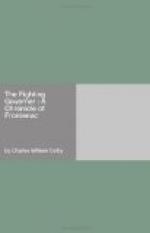Assuming the standards of his own age, a reasonable plea can also be made on Frontenac’s behalf respecting the conduct of his wars. ’Man’s inhumanity to man makes countless thousands mourn’ in our own day no less than in the seventeenth century; while certain facts of recent memory are quite lurid enough to be placed in comparison with the border raids which, under Frontenac, were made by the French and their Indian allies. It is dreadful to know that captured Iroquois were burned alive by the French, but after the Lachine massacre and the tortures which French captives endured, this was an almost inevitable retaliation. The concluding scenes of King Philip’s War prove, at any rate, that the men of New England exercised little more clemency towards their Indian foes than was displayed by the French. The Puritans justified their acts of carnage by citations from the Old Testament regarding the Canaanites and the Philistines. The most bitter chronicler of King Philip’s War is William Hubbard, a Calvinist pastor of Ipswich. On December 19, 1675, the English of Massachusetts and Connecticut stormed the great stronghold of the Narragansetts. To quote John Fiske: ’In the slaughter which filled the rest of that Sunday afternoon till the sun went down behind a dull gray cloud, the grim and wrathful Puritan, as he swung his heavy cutlass, thought of Saul and Agag, and spared not. The Lord had delivered up to him the heathen as stubble to his sword. As usual the number of the slain is variously estimated. Of the Indians probably not less than a thousand perished.’
For the slaughter of English women and children by French raiders there was no precedent or just provocation. Here Frontenac must be deemed more culpable than the Puritans. The only extenuating circumstance is that those who survived the first moments of attack were in almost all cases spared, taken to Canada, and there treated with kindness.
Writers of the lighter drama have long found a subject in the old man whose irascibility is but a cloak for goodness of heart. It would be an exaggeration to describe Frontenac as a character of this type, for his wrath could be vehement, and benevolence was not the essential strain in his disposition. At the same time, he had many warm impulses to his credit. His loyalty to friends stands above reproach, and there are little incidents which show his sense of humour. For instance, he once fined a woman for lampooning him, but caused the money to be given to her children. Though often unfair in argument, he was by nature neither mean nor petty. In ordinary circumstances he remembered noblesse oblige, and though boastfulness may have been among his failings, he had a love of greatness which preserved him from sordid misdemeanours. Even if we agree with Parkman that greatness must be denied him, it yet remains to be pointed out that absolute greatness is a high standard attained by few. Frontenac was a greater man than most by virtue of robustness, fire, and a sincere aspiration to discharge his duty as a lieutenant of the king.




